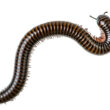Figuring out how to keep fruit flies away from bananas is trickier than it seems. These little bugs can seemingly appear out of nowhere, and the ones you get rid of are instantly replaced with others!
This guide will teach you how to prevent fruit flies from getting on your bananas, and teach you how to store bananas in a way that keeps these insects away.
Table of Contents
Why Do Fruit Flies Like Bananas So Much?
There is a classic joke that says, “Time flies like an arrow. Fruit flies like a banana.” Yes, we know it’s pretty corny, but there is more than a little truth to it. Wherever you have bananas, you’ll most likely find fruit flies.
Fruit flies, also sometimes called vinegar flies, are tiny, flying insects that are attracted to the sweet odor and taste of ripe and rotten fruit. Not only will fruit flies make a meal of your bananas, but they will also lay eggs on them. In fact, a single female fruit fly can lay up to 2,000 eggs at a time, and once the eggs hatch, the resulting maggots will use the ripe or rotting banana as a food source.
Bananas serve as food for the adult fruit flies, as a place to lay eggs and as a food source for newly hatched maggots, so it’s no wonder that bananas attract fruit flies. Of course, these insects will also swarm other fruit that you have around, but bananas seem to be a particular favorite.
How To Keep Fruit Flies Away From Bananas
Sure, fruit flies on bananas are annoying, but do they pose any kind of health threat? The surprising answer is that fruit flies are often transmitters of diseases such as E. coli, listeria and salmonella. If fruit flies become exposed somewhere to one of these diseases, and they decide to invade your bananas, then it’s possible that you or your family could become sick by touching and eating the bananas.
Not only do fruit flies on bananas have the potential to make you and your family sick, but a few of these insects can very quickly turn into a swarm. In most cases, a fruit fly problem almost never gets that out of control, but it’s still important to keep fruit flies away from your bananas and other fruits.
Unless the problem is very severe, there are a few DIY ways to keep fruit flies away from bananas. The good thing is that these methods are all non-toxic and easy to do. Let’s take a closer look at a few.
1. Create A Ginger Mixture
Ginger, a pungent root that is often used in recipes and in herbal medicines, can also be used to help keep fruit flies away from bananas. There are a couple of ways that you can utilize ginger, and they are both thought to work fairly well.
For the most part, fruit flies seem to be repelled by the smell of ginger. To take advantage of this, you can make up a solution of about three cups of water and a few pinches of powdered ginger. Put the solution into a spray bottle and spray the areas where you see the fruit flies, or where you think they may be coming in.
However, one study has shown that male fruit flies may be attracted to the scent of ginger, so creating a ginger-laced trap may also be helpful. To create a ginger trap, mix powdered ginger with yeast, sugar and water. Place this mixture into a shallow dish, cover the dish with plastic wrap and poke tiny holes in the plastic.
The idea is that male fruit flies may be attracted by both the sugar and the ginger. Once they fly through the holes in the plastic, they become trapped and will eventually die.
2. Keep Your Bananas In The Fridge
Even though every cookbook and food expert will tell you to keep bananas out of the refrigerator, putting them in the fridge may actually help if you want to prevent fruit flies from getting on them. If you bought bananas that are a bit green and not yet very ripe, then you can probably get away with keeping them in a fruit bowl for a few days. However, once they begin to ripen you may want to try putting them into the fridge.
Fruit flies don’t do well in very cold temperatures, so sticking the bananas in the fridge will kill any flies, eggs or larvae that are on the bananas. Your bananas won’t look very nice after a couple of days in the fridge, but they will still be quite tasty.
3. Remove Moisture
Fruit flies, like many insects, are attracted to moisture. This means that if you want to keep fruit flies away from your bananas and out of your living space, then you’ll need to eliminate as many sources of moisture as you can.
What kinds of moisture sources are we talking about? Things like dishes soaking in the sink, wet dishcloths, dripping faucets, open soda bottles and just about anything else that is damp or wet. Washing and drying dishes, wringing out sponges and dishcloths, repairing leaks and keeping things generally clean will help prevent fruit flies from ending up on your bananas.
4. Use Apple Cider Vinegar
These days, you’ll see apple cider vinegar used in things ranging from all-purpose cleaners and deodorizers to hair rinses and denture cleaners. But did you know that apple cider vinegar can also be used to deal with fruit flies?
If you’re looking for a non-toxic way to keep fruit flies away from your bananas, then this method is for you. All you need is a shallow bowl, apple cider vinegar, a drop of dish soap and some plastic wrap.
Pour some apple cider vinegar into the bowl, add a drop or two of dish soap and cover the bowl with plastic wrap. Poke some small holes in the plastic wrap and place your homemade trap near your fruit bowl. Then all you need to do is to watch the magic happen.
If all goes as it should, the flies will be attracted to the vinegar, they’ll crawl through the holes in the plastic wrap, and they’ll become trapped there. This method is pretty good for a small number of fruit flies near your bananas, but it may not work as well if you have a larger problem.
5. Store Your Bananas In An Airtight Container
Storing your bananas in an airtight container may be an idea that goes against your sense of proper banana care, but it can be a helpful way to keep fruit flies from invading. The one drawback to using this method is that your bananas are going to ripen a lot sooner than if you just left them out.
When we talk about storing your bananas in an airtight containers, we don’t necessarily mean only plastic, Tupperware-like containers. A cake stand with a glass dome is an attractive alternative to plastic, and you’ll still have the benefit of an airtight cover.
A food tent, while not airtight, may work as well because the holes in the mesh are too small to allow fruit flies to enter. There are some nice looking ones out there, so you may want to consider this as well.
6. Set Up A Fly Trap
Something worth considering is to use a simple, old-fashioned fly trap. You can find ones that are specifically designed for fruit flies, and they work just like the traditional fly traps you may be used to.
Hang a few of these fruit fly traps near the area where you store your bananas. It shouldn’t be long before you see lots of these flies stuck to the sticky surface of the trap. We’ll admit that these traps are unsightly, so you will probably want to change them fairly often.
7. Clean Your Bananas
If you’ve never heard of washing your bananas, then you’re not alone. Not many people realize that it’s as important to wash your bananas as it is to wash your lettuce.
Fruit flies lay thousands of eggs on the surface of bananas. This means that if you don’t wash your bananas as soon as you get them home, then there’s a good chance that any eggs that are on the bananas are going to hatch. Once they do, then you have a fruit fly issue. Since the eggs are so tiny, there’s no way to know if the bananas that you’re bringing from the store are covered in eggs or not. Washing them minimizes the risk.
After you’ve gently washed your bananas, make sure to dry them thoroughly. Damp bananas are also attractive to fruit flies.
8. Keep Your Bananas Near Basil Leaves
A strange but simple way to keep fruit flies away from bananas is to use basil leaves. These insects dislike the smell of basil, so placing basil near your bananas may be able to ward off any invading flies.
Basil leaves, basil plants or even a sprig of basil in a glass of water will do. Replace the leaves as needed.
9. Try Some Lavender
You might love the smell of lavender, but fruit flies don’t. You can use this to your advantage by placing lavender-scented items near your bananas if you’re trying to prevent fruit flies from entering the area.
The best way to use lavender for this purpose is to soak a small sponge or some cotton balls in lavender essential oil. Once you put these items in strategic areas, fruit flies should stay away. Of course, this doesn’t always work, and the sponge or cotton balls will need to be replaced often.
You can also place a potted lavender plant in the area, or you can just scatter a few sprigs around. It’s totally up to you.
10. Crank Up The Wind
A very simple way to keep fruit flies away from your bananas is to place some kind of a fan in the area. This could be a table top fan or a standing fan, and it should ideally be set on the oscillating setting.
The idea is that most fruit flies are no match for the wind produced by a household fan. If there is a consistent breeze near your bananas, then in theory, fruit flies won’t be able to land. This method will work pretty well when the fan is on, but it’s not really practical to keep it running all day and all night. We recommend using this trick in conjunction with one or more of the other ones mentioned earlier.
11. Call In The Professionals
It’s rare that a fruit fly infestation makes your home a place of misery, but it can happen. If you’ve tried some do-it-yourself remedies and they are not working, then you may need to call a pest control specialist
In the case of a severe infestation, there is probably more going on than meets the eye. A professional is trained to notice what the average homeowner wouldn’t normally pay attention to, and will be able to come up with an affordable and successful way to keep fruit flies away from your bananas (and get them out of your house in general).
Conclusion
Now that you know how to keep fruit flies away from bananas, all you need to do is start experimenting with the methods that appeal to you. Depending on the severity of your problem and the amount of time you want to put in, the tactics you choose might vary.
But rest assured, they’re all effective.


